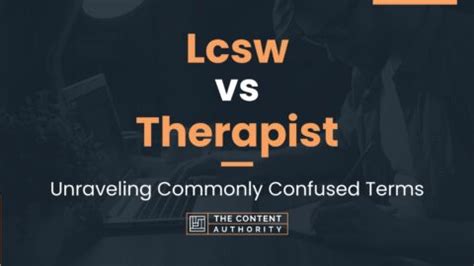Introduction

Navigating the complexities of the mental health field can be daunting, especially when it comes to choosing the right path for your career. Two frequently compared paths are Licensed Clinical Social Worker (LCSW) and Doctor of Psychology (PsyD). This article aims to shed light on the key distinctions between these two credentials, empowering you to make an informed decision that aligns with your professional goals.
LCSW: Licensure and Scope of Practice
Licensed Clinical Social Workers hold a master’s degree in social work (MSW) and complete a certain number of supervised clinical hours. They are licensed to provide a wide range of mental health services, including psychotherapy, crisis intervention, and case management. LCSWs often work in various settings such as hospitals, clinics, schools, and private practice. According to the National Association of Social Workers (NASW), there are approximately 680,000 LCSWs in the United States.
PsyD: Doctoral Degree and Practice Focus
Doctor of Psychology (PsyD) is a terminal degree that prepares individuals for advanced clinical practice. PsyD programs typically require a master’s degree in psychology or a related field as a prerequisite. They encompass extensive coursework, research, and supervised clinical experience. PsyDs are qualified to provide psychotherapy, conduct psychological evaluations, and engage in clinical research. Many PsyDs work in private practice, specialized clinics, or academic institutions. As of 2021, there are approximately 35,000 PsyDs in the United States.
LCSW:
- Master’s degree in social work (MSW), with a focus on clinical practice
- Supervised clinical experience, typically 1,000-1,300 hours
PsyD:
- Doctorate degree in psychology
- Dissertation research and defense
- Supervised clinical experience, typically 2,000-4,000 hours
LCSW:
- Psychotherapy
- Case management
- Crisis intervention
- Advocacy and outreach
PsyD:
- Psychotherapy
- Psychological evaluations
- Clinical research
- Consultation and supervision
- Specialized interventions, depending on the training and experience
LCSW:
- Median annual salary: $62,230 (Bureau of Labor Statistics, 2020)
- Projected job growth: 15% from 2019-2029
PsyD:
- Median annual salary: $85,110 (Bureau of Labor Statistics, 2020)
- Projected job growth: 14% from 2019-2029
The choice between LCSW and PsyD depends on your career goals, financial resources, and personal preferences. Here are some factors to consider:
If you’re interested in:
- Direct clinical work: Both LCSW and PsyD provide ample opportunities for providing psychotherapy and other clinical services.
- Advanced research experience: PsyD programs offer a more in-depth research component than MSW programs.
- Psychological evaluations: PsyDs are qualified to conduct psychological evaluations, which LCSWs are not.
- Private practice: PsyDs typically have more autonomy and flexibility in private practice settings.
If you’re concerned about:
- Cost and time commitment: LCSW programs are generally more affordable and require less time to complete than PsyD programs.
- Licensing requirements: LCSW licensing is typically easier to obtain and maintain than PsyD licensure.
Table 1: Education and Training Comparison
| Credential | Degree | Supervised Clinical Hours |
|---|---|---|
| LCSW | Master’s in Social Work (MSW) | 1,000-1,300 |
| PsyD | Doctorate in Psychology | 2,000-4,000 |
Table 2: Scope of Practice Comparison
| Credential | Psychotherapy | Case Management | Crisis Intervention | Psychological Evaluations |
|---|---|---|---|---|
| LCSW | Yes | Yes | Yes | No |
| PsyD | Yes | Yes | Yes | Yes |
Table 3: Earning Potential and Job Outlook Comparison
| Credential | Median Annual Salary | Projected Job Growth (2019-2029) |
|---|---|---|
| LCSW | $62,230 | 15% |
| PsyD | $85,110 | 14% |
Table 4: Factors to Consider When Choosing
| Factor | LCSW | PsyD |
|---|---|---|
| Direct clinical work | Yes | Yes |
| Advanced research experience | Limited | Extensive |
| Psychological evaluations | No | Yes |
| Private practice autonomy | More limited | More flexible |
| Cost and time commitment | More affordable | More expensive |
| Licensing requirements | Easier to obtain | More complex |
The decision between LCSW and PsyD is a personal one that should align with your individual goals and circumstances. Both credentials offer valuable pathways to a fulfilling career in mental health. By understanding the differences in education, training, scope of practice, and earning potential, you can make an informed choice that will serve you well throughout your professional journey.
